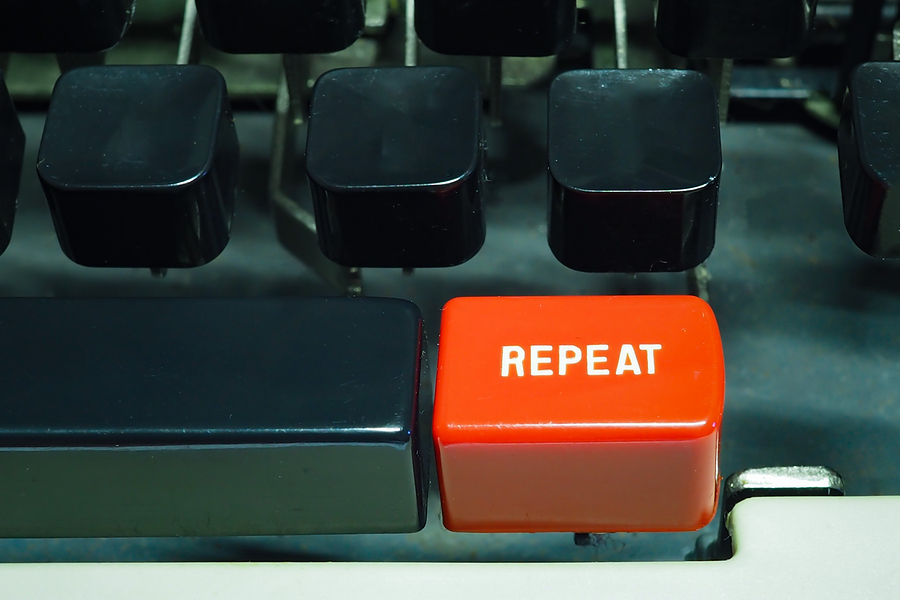Writers should know how to write. Right?
But that is easier said than done. “Monsters. . . lie in ambush for the writer trying to put together a clean English sentence,” says William Zinsser in On Writing Well. Numerous dangers line the road to becoming an accomplished and published (and much-published) writer. As a writer, editor, and agent, I see the same mistakes over and over and over (such as repetitive wording). Here are some of the most common:
- Overwriting. Never use a dollar word when a dime will do. Your object should not be to impress with the size of your vocabulary, but to communicate.
- Using too many adverbs and adjectives. Let nouns and verbs do the heavy lifting. “In general,” write Strunk and White in The Elements of Style, “it is nouns and verbs, not their assistants, that give to good writing its toughness and color.”
- Using unnecessary words. Eliminate all unnecessary words (as well as sentences and paragraphs, of course). “If you give me an article that runs to eight pages and I tell you to cut it to four,” says Zinsser, “you’ll howl and say it can’t be done. Then you will go home and do it, and it will be infinitely better. After that comes the hard part: cutting it to three.”
- Using cliches, platitudes, qualifiers, jargon, and overdone words. Like “white as snow.” And “God works all things together for good.” Like rather, very, little, pretty. And “washed in the blood of the Lamb.” And if I hear about someone being “impacted” again, I’ll scream like a banshee.
- Using long, run-on sentences. “When a sentence is shorter,” writes Susan Titus Osborn in Write Now, “it usually becomes stronger. Try to keep your sentences under 25 words.”
- Not varying sentence length. Vary the length and the structure of your sentences.
- Not explaining your terms. Readers aren’t stupid, but they’re not mind-readers, either. When you use a term that may be unfamiliar, define it. These days, this applies especially to Bible quotes, references, and allusions; don’t assume that your reader knows anything about the Bible.
- Using passive verbs and construction. “Pain clutched his abdomen” is better than “he was in pain” or “he felt pain.”
- Generalizing. Avoid abstractions; be concrete and specific. For example, did he sit under a tree? Or was it a magnolia? A manzanita?
- Exaggerating. “Don’t overstate,” writes Zinsser. “You didn’t really consider jumping out the window.” And “literally” literally means “literally” (for example, please don’t say “he literally hit the ceiling” unless he literally hit the ceiling).
- Telling. “Show, don’t tell” means letting such things as action, dialogue, and (sparingly) flashbacks—not exposition—convey what you want the reader to know.
- Neglecting transitions. “Your paragraphs must flow into each other,” writes Osborn. Sometimes a single word will do: however, nevertheless, later, therefore.
- Not reading your work aloud. Read it aloud. Seriously, read it aloud. Or, better yet, have someone else read it aloud to you.
- Overwriting dialogue tags. “He said” is better than “he interjected,” “he exclaimed,” or “he whispered.” And it’s always better than “he interlocuted.” Better yet: let action and pacing indicate who is speaking.
- Not inviting or accepting criticism. Henry James self-published his books before allowing a publisher to print them; he passed them out to friends whose opinions he valued and invited their criticism. You may not go to that extreme but you should invite others to edit and critique your work and learn to accept wise feedback.
These may seem obvious to you, but you would probably be surprised (as I often am) at how many writers make these mistakes—and then show them to an agent or editor! Don’t be that person. Exterminate these fifteen mistakes in everything you write, and you’ll be glad you did (and so will your agent or editor).



 Unnecessary Worry
Unnecessary Worry

I can tell my writing is improving because I am now getting critiqued on more sophisticated mistakes. Number 14 surprised me though. “Said” is really better than “whispered?”
Now can you write the top 15 mistakes in nonfiction writing?
Yes, Janine ROW-SHAY, it often is. Today’s readers tend to skip over “he said” more or less, registering it without reading it, and thus moving the reading along, whereas exposition in the form of dialogue tags slows the reader down.
And I do plan a future post on more writing pitfalls, but the above are actually interchangeable between fiction and nonfiction (for example, we use dialogue and “show don’t tell” in nonfiction too).
One thing that always crops up for me is repetition. I’ll use the same word too frequently, or the same description too frequently. Also, filtering, which is a slippery one.
Yes, me too. I have a mental index of words to “find/replace” when I finish a draft, just one of numerous “find/replace” exercises I do (which I will write about in a few weeks!).
I recently removed 1500 “as” words from my manuscript. Yes, that many. Lol! I also removed over 4,000 unnecessary words which took out a few paragraphs. I appreciate reminders like this that helps me improve my writing.
Well done! Maybe I’m weird (now there’s a safe bet) but I actually find the trimming process to be fun.
You’re not the only weird one. At a writers conference, I was the only nerd who raised their hand when asked who enjoyed having their work edited. I love to see my babbling cleaned up and sharpened to a point.
I do, too, Bob, but I prefer to think of myself as “exceptional” rather than “weird.” Nah, weird is the shorter and more accurate descriptor.
I track my progress chapter by chapter in an Excel file that lists the original word count when I finished the first draft and the changing count as I progress through my many edits. It’s an easy way to give myself positive feedback that I’m making progress in refining the manuscript. The weird part of me makes me calculate the percentage change at the end of each writing session. The better I write the first draft, the smaller those percentages become. That’s positive feedback, too.
I, like Brennan, find that I repeat the same term. One of my critique group members is adept at graciously bringing those to my attention. Critique groups a quite helpful at pointing out these landmines in our writing.
Ouch, ouch, ouch.
But thanks for the compliment.
As for the biblical allusions bit, it usually does take a few more words but can usually be done fairly succinctly. For example, instead of “Paul the Apostle says in 1 Cor. 13,” I might write, “a first-century church planter named Paul wrote a letter to early Christians in Corinth, saying…” It takes practice to do it without condescending or confusing, but it’s worth the effort.
Oh, and I should mention too…many of today’s readers have no idea what “1 Cor.” refers to, so I’ll always spell out Bible references. Better yet, I will footnote them.
Good point about spelling out, Bob. I always do that on my blog and Facebook posts because not everyone who visits knows what they are.
Not everyone ruled “Sword Drills” and “Bible Baseball” like I did.
Yes, Damon. I highly recommend good critique for identifying and extricating landmines.
Great information. Thank you.
Thank you, thank you, thank you Bob! (oops, that’s redundant!). May I pass your blog along to my students at three colleges? I think they would really benefit from this posting.
Yes, by all means. Send them to this link!
An excellent list. Concise and pointed.
Thank you for this post, Bob. I may have to use this almost as a self-editing checklist!
Just send me royalties every time you do, Rachel.
Great list, Bob, and number 15 is vital, especially when you tell the people you really, really, really want everything negative they can come up with. I have 3 beta readers (one of whom beta-reads for several traditionally published authors) and a critique partner (who has won awards for her writing). They give me very detailed feedback on every chapter. Every one of them makes the manuscript stronger and more polished after I fold in their comments. My alpha beta even reads the critically important sections for me after each of several edits when I ask for that.
I also try out the beginning and the most important scenes on friend who is a superb writer in his own right. That feedback is invaluable for getting to a point where the manuscript is as good as what I’m reading from the traditional publishers even before I send part (especially the spiritual climax scenes to insure the ring of truth) to a professional line editor.
It truly takes a team to get quality, and those folks who will tell you what needs fixing are pure gold.
Hi Bob, thanks for taking time to help us with this excellent article. These pitfalls cannot be overstated. I am printing and pinning them up now!
Twenty years of writing :60 and 3:00 radio scripts for “Jesus Freaks Radio,” “Today’s Father,” “Family Facts,” “City on Our Knees,” “Pro-life Commentaries,” and so on have forced me to cut, cut, cut in order to say a lot in a limited time. These days, I literally have a hard time writing more than 2,000 words on any topic!
Thank You. I should post these reminders right over my desk. One word I see to often in my work is revelation. I even struggled not to use it here.
I also think getting rid of articles, to the best of the authors ability, is a great idea! For example: this, things, that, it, etc.
I recently read a self-published book and the word “things” drove me crazy, lol!
Great post 😀
Great post! Thank you, Bob.
Thanks for posting these *very* important reminders! I’m going through the editing process right now, so I’ll print up this list to keep handy.
Good reminders. Thank you.
Excellent instruction, Bob! I see all these mistakes in the academic writing I edit. My greatest challenge was cutting an 800-page first draft of a doctoral thesis to the required 150-200 pages. (Even brilliant scholars forget to check the rules.) I would add “Figures of speech” to #4 on your list: If a book is ever read in a different context or translated into a different language from the author’s, figures of speech can be meaningless or misunderstood. Saying someone is “over the moon” is well understood in US informal conversation, but in another culture, it might trigger visions of astronauts. “Boils down to” might be meaningless to someone who has never cooked. My current banshee-scream word is “updated,” and I think “banal” may take its place before Christmas. 😀
Thought-provoking point, Linda. Figures of speech present an interesting problem in fiction. They can be very regional or limited to a particular time period, yet they lend color and distinctive voice to the characters that use them.
“Boils down to” might be especially meaningful to someone who boiled something dry because they truly didn’t know how to cook.
I use some foreign words in my Roman novels because there aren’t modern English equivalents that describe the item or practice without too much narrative description that would slow the pace. The general meaning comes from contest, but I include a glossary for the non-English words at the end to help. I also add a historical note at the end to explain something in the society of that era which underlies the story but doesn’t have a modern equivalent or isn’t generally known.
Context, not contest, although I guess there could be an argument over the meaning of something.
Here are the ones I found most helpful today:
13. “Not reading your work aloud.” Hearing it with all my ears – external and internal. I love this.
15. “Not inviting or accepting criticism.” Yes, I need to ask for it, maybe even beg!